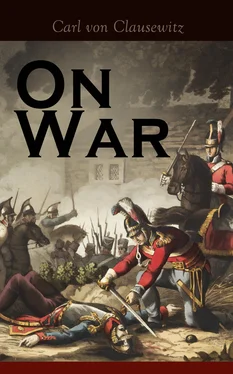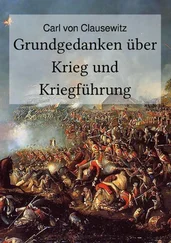In connection with the plan of a campaign we shall hereafter examine more closely into the meaning of disarming a nation, but here we must at once draw a distinction between three things, which, as three general objects, comprise everything else within them. They are the military power, the country , and the will of the enemy .
The military power must be destroyed, that is, reduced to such a state as not to be able to prosecute the War. This is the sense in which we wish to be understood hereafter, whenever we use the expression “destruction of the enemy’s military power.”
The country must be conquered, for out of the country a new military force may be formed.
But even when both these things are done, still the War, that is, the hostile feeling and action of hostile agencies, cannot be considered as at an end as long as the will of the enemy is not subdued also; that is, its Government and its Allies must be forced into signing a peace, or the people into submission; for whilst we are in full occupation of the country, the War may break out afresh, either in the interior or through assistance given by Allies. No doubt, this may also take place after a peace, but that shows nothing more than that every War does not carry in itself the elements for a complete decision and final settlement.
But even if this is the case, still with the conclusion of peace a number of sparks are always extinguished which would have smouldered on quietly, and the excitement of the passions abates, because all those whose minds are disposed to peace, of which in all nations and under all circumstances there is always a great number, turn themselves away completely from the road to resistance. Whatever may take place subsequently, we must always look upon the object as attained, and the business of War as ended, by a peace.
As protection of the country is the primary object for which the military force exists, therefore the natural order is, that first of all this force should be destroyed, then the country subdued; and through the effect of these two results, as well as the position we then hold, the enemy should be forced to make peace. Generally the destruction of the enemy’s force is done by degrees, and in just the same measure the conquest of the country follows immediately. The two likewise usually react upon each other, because the loss of provinces occasions a diminution of military force. But this order is by no means necessary, and on that account it also does not always take place. The enemy’s Army, before it is sensibly weakened, may retreat to the opposite side of the country, or even quite outside of it. In this case, therefore, the greater part or the whole of the country is conquered.
But this object of War in the abstract, this final means of attaining the political object in which all others are combined, the disarming the enemy , is rarely attained in practice and is not a condition necessary to peace. Therefore it can in no wise be set up in theory as a law. There are innumerable instances of treaties in which peace has been settled before either party could be looked upon as disarmed; indeed, even before the balance of power had undergone any sensible alteration. Nay, further, if we look at the case in the concrete, then we must say that in a whole class of cases, the idea of a complete defeat of the enemy would be a mere imaginative flight, especially when the enemy is considerably superior.
The reason why the object deduced from the conception of War is not adapted in general to real War lies in the difference between the two, which is discussed in the preceding chapter. If it was as pure theory gives it, then a War between two States of very unequal military strength would appear an absurdity; therefore impossible. At most, the inequality between the physical forces might be such that it could be balanced by the moral forces, and that would not go far with our present social condition in Europe. Therefore, if we have seen Wars take place between States of very unequal power, that has been the case because there is a wide difference between War in reality and its original conception.
There are two considerations which as motives may practically take the place of inability to continue the contest. The first is the improbability, the second is the excessive price, of success.
According to what we have seen in the foregoing chapter, War must always set itself free from the strict law of logical necessity, and seek aid from the calculation of probabilities; and as this is so much the more the case, the more the War has a bias that way, from the circumstances out of which it has arisen—the smaller its motives are, and the excitement it has raised—so it is also conceivable how out of this calculation of probabilities even motives to peace may arise. War does not, therefore, always require to be fought out until one party is overthrown; and we may suppose that, when the motives and passions are slight, a weak probability will suffice to move that side to which it is unfavourable to give way. Now, were the other side convinced of this beforehand, it is natural that he would strive for this probability only, instead of first wasting time and effort in the attempt to achieve the total destruction of the enemy’s Army.
Still more general in its influence on the resolution to peace is the consideration of the expenditure of force already made, and further required. As War is no act of blind passion, but is dominated by the political object, therefore the value of that object determines the measure of the sacrifices by which it is to be purchased. This will be the case, not only as regards extent, but also as regards duration. As soon, therefore, as the required outlay becomes so great that the political object is no longer equal in value, the object must be given up, and peace will be the result.
We see, therefore, that in Wars where one side cannot completely disarm the other, the motives to peace on both sides will rise or fall on each side according to the probability of future success and the required outlay. If these motives were equally strong on both sides, they would meet in the centre of their political difference. Where they are strong on one side, they might be weak on the other. If their amount is only sufficient, peace will follow, but naturally to the advantage of that side which has the weakest motive for its conclusion. We purposely pass over here the difference which the positive and negative character of the political end must necessarily produce practically; for although that is, as we shall hereafter show, of the highest importance, still we are obliged to keep here to a more general point of view, because the original political views in the course of the War change very much, and at last may become totally different, just because they are determined by results and probable events .
Now comes the question how to influence the probability of success. In the first place, naturally by the same means which we use when the object is the subjugation of the enemy, by the destruction of his military force and the conquest of his provinces; but these two means are not exactly of the same import here as they would be in reference to that object. If we attack the enemy’s Army, it is a very different thing whether we intend to follow up the first blow with a succession of others, until the whole force is destroyed, or whether we mean to content ourselves with a victory to shake the enemy’s feeling of security, to convince him of our superiority, and to instil into him a feeling of apprehension about the future. If this is our object, we only go so far in the destruction of his forces as is sufficient. In like manner, the conquest, of the enemy’s provinces is quite a different measure if the object is not the destruction of the enemy’s Army. In the latter case the destruction of the Army is the real effectual action, and the taking of the provinces only a consequence of it; to take them before the Army had been defeated would always be looked upon only as a necessary evil. On the other hand, if our views are not directed upon the complete destruction of the enemy’s force, and if we are sure that the enemy does not seek but fears to bring matters to a bloody decision, the taking possession of a weak or defenceless province is an advantage in itself, and if this advantage is of sufficient importance to make the enemy apprehensive about the general result, then it may also be regarded as a shorter road to peace.
Читать дальше












